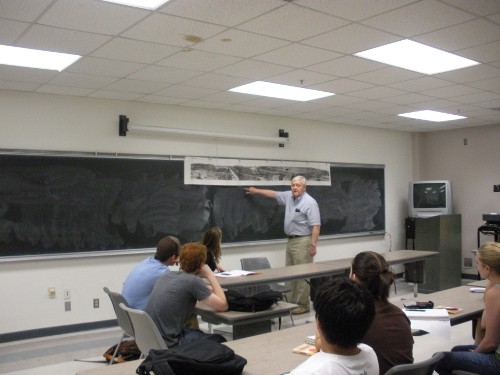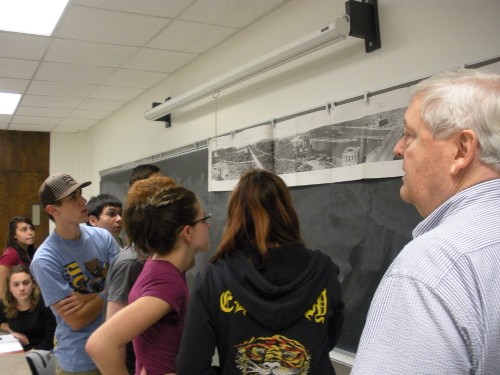UCLA offers course on the atomic bombing of Hiroshima
Jun. 3, 2010
The UCLA History Department offers a freshman seminar on the atomic bombing of Hiroshima. Taught by Professor Ludwig Lauerhass, the class treats the remembrance, history, and commemoration of the bombing from its occurrence on August 6, 1945 through its 50th anniversary in 1995. The details of the course are described in the following syllabus:
The first military use of atomic bombs, dropped on Hiroshima and Nagasaki in August 1945, devastated the two cities, precipitated the end of World War II, and ushered in the new Atomic Age. This greatest man-made calamity in the history of the world resulted in the immediate death of more than 100,000 people, and sparked endless, seemingly irresolvable debates which continue to this day. "Were the bombings strategically necessary or morally justifiable?" The long-term effects have been profound—militarily, politically, and psychologically. The event has been subject to widely divergent interpretations in the United States, Japan, and the world at large.
This year 18 students of varying backgrounds, including two Japanese-American students, were introduced to this subject about which most had very little knowledge. Two had grandfathers who had been in the army during World War II and had told these students that the atomic bombing had been necessary to save American lives by ending the war as soon as possible.
By the end of the class students had been shocked by the enormity of the human tragedy and had come to a fuller understanding of the event with its vast array of complex issues. In general, they strongly regretted the horrors of the bombing and its aftermath, as well as the continuing threat posed by atomic weapons, but they were still divided on the question of their military and political necessity in 1945. The class, however, did change minds, with several questioning the official justification for the use of the bomb on the civilian population of the city. All agreed that the future use of the hugely expanded nuclear arsenals would be disastrous and unthinkable.
The class had introduced them to a wide variety of perspectives, including the very personal accounts of bomb victims, the range of American, Japanese, and European opinion, and the ongoing debates of scholars and public officials. A number of students expressed a desire to visit Hiroshima and Peace Park, to talk with survivors or the children of survivors, to do further research on the topic, exploring the changing feelings of American and Japanese about each other. One student summed up the attitude held by many: "Overall, this class was an eye-opening experience that I really enjoyed and felt really engaged by."
The first military use of atomic bombs, dropped on Hiroshima and Nagasaki in August 1945, devastated the two cities, precipitated the end of World War II, and ushered in the new Atomic Age. This greatest man-made calamity in the history of the world resulted in the immediate death of more than 100,000 people, and sparked endless, seemingly irresolvable debates which continue to this day. "Were the bombings strategically necessary or morally justifiable?" The long-term effects have been profound—militarily, politically, and psychologically. The event has been subject to widely divergent interpretations in the United States, Japan, and the world at large.
This year 18 students of varying backgrounds, including two Japanese-American students, were introduced to this subject about which most had very little knowledge. Two had grandfathers who had been in the army during World War II and had told these students that the atomic bombing had been necessary to save American lives by ending the war as soon as possible.
By the end of the class students had been shocked by the enormity of the human tragedy and had come to a fuller understanding of the event with its vast array of complex issues. In general, they strongly regretted the horrors of the bombing and its aftermath, as well as the continuing threat posed by atomic weapons, but they were still divided on the question of their military and political necessity in 1945. The class, however, did change minds, with several questioning the official justification for the use of the bomb on the civilian population of the city. All agreed that the future use of the hugely expanded nuclear arsenals would be disastrous and unthinkable.
The class had introduced them to a wide variety of perspectives, including the very personal accounts of bomb victims, the range of American, Japanese, and European opinion, and the ongoing debates of scholars and public officials. A number of students expressed a desire to visit Hiroshima and Peace Park, to talk with survivors or the children of survivors, to do further research on the topic, exploring the changing feelings of American and Japanese about each other. One student summed up the attitude held by many: "Overall, this class was an eye-opening experience that I really enjoyed and felt really engaged by."









